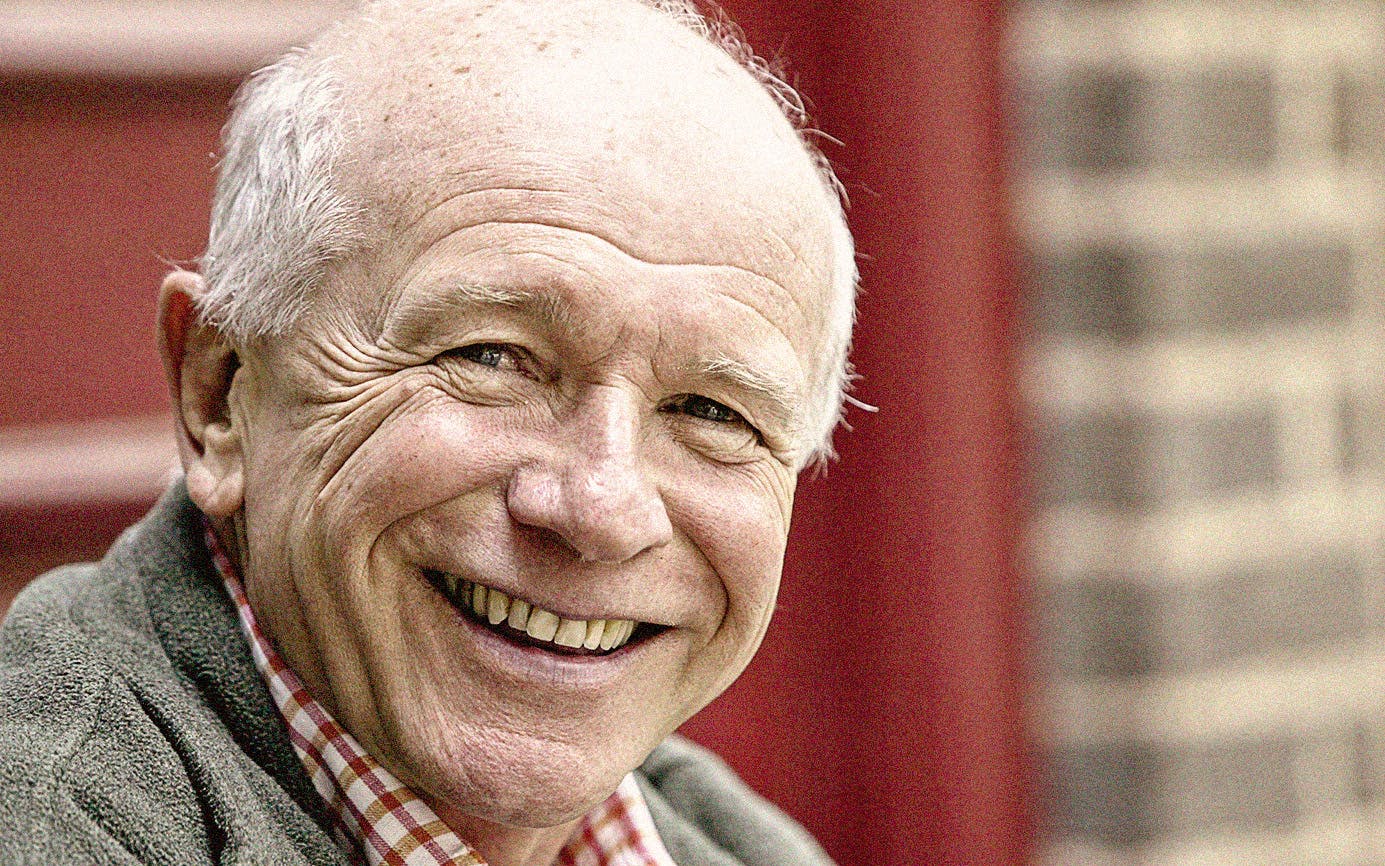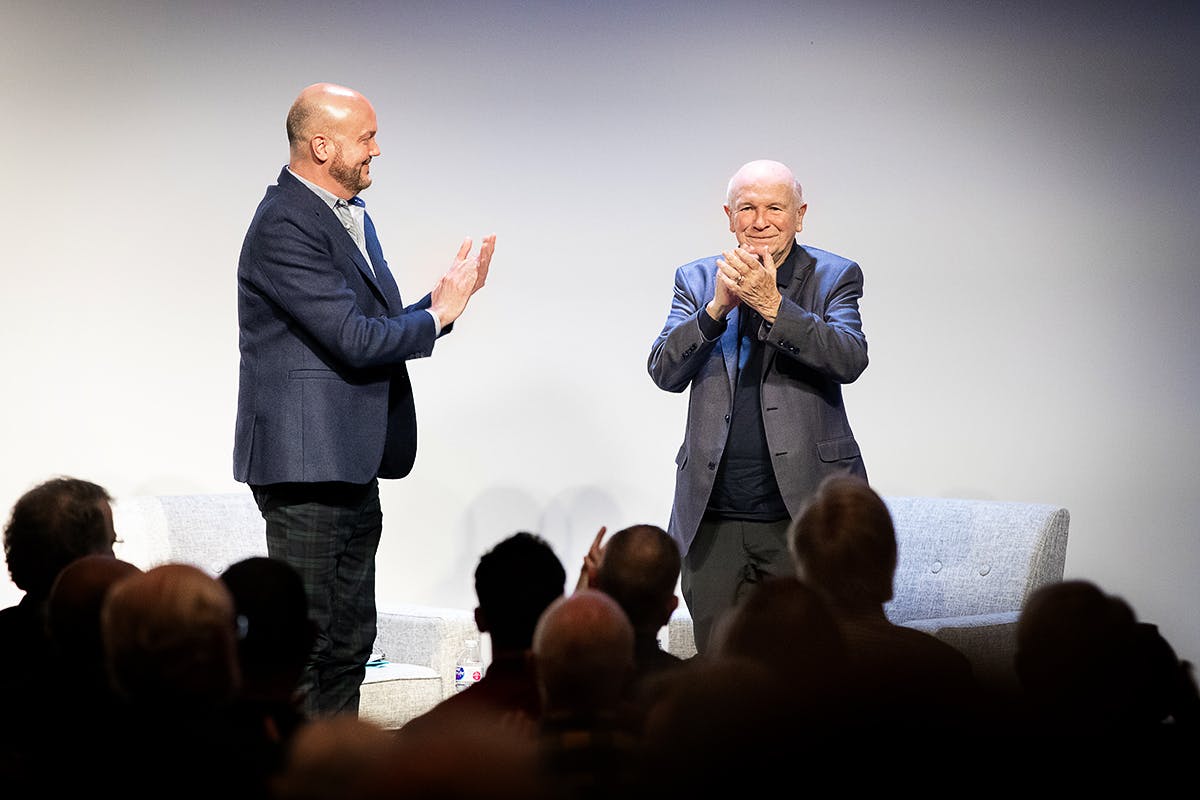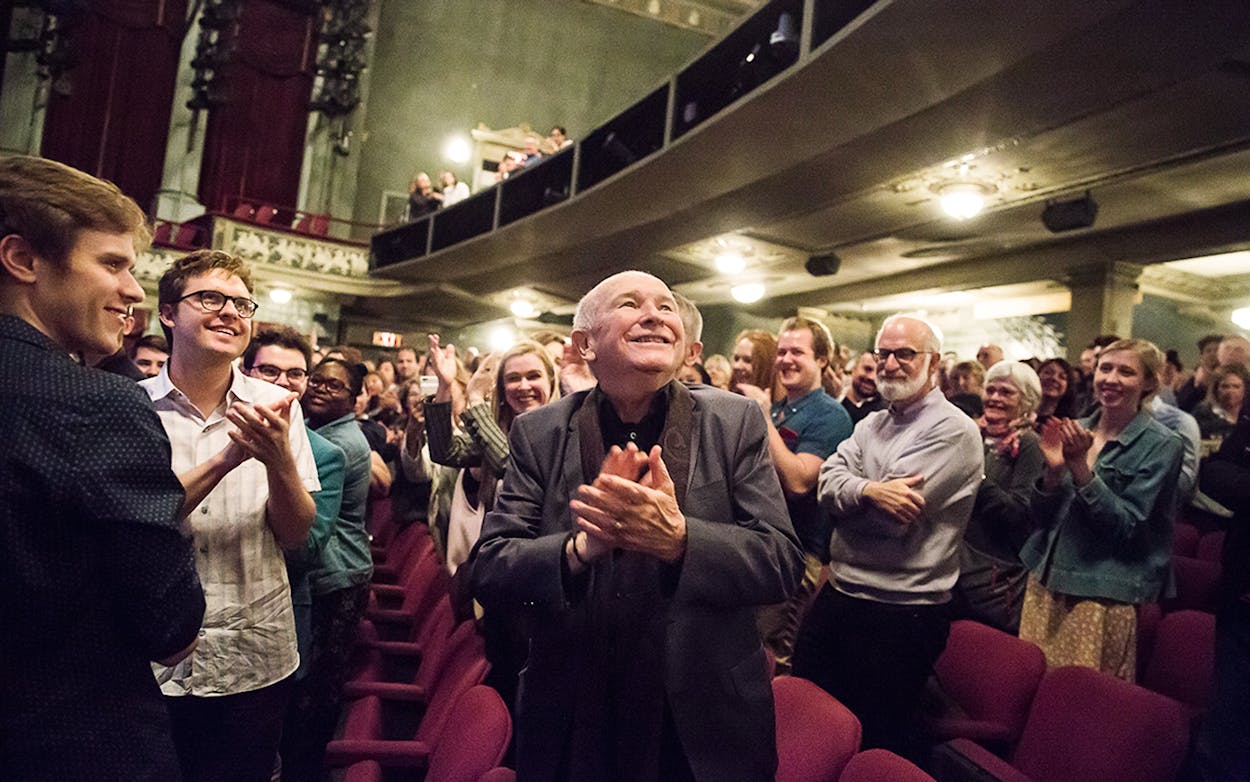Terrence McNally, the prolific playwright with Texas roots, passed away this week in Florida from coronavirus-related complications. A lung cancer survivor, McNally had lost portions of both lungs and suffered from a chronic pulmonary disorder. He was 81.
Over his six-decade career, McNally received Tony Awards for two musicals, Kiss of the Spider Woman (1993) and Ragtime (1998), and two plays, Love! Valour! Compassion! (1995) and Master Class (1996). McNally, who grew up in Corpus Christi and Dallas, went on to write dozens more plays and musicals (including The Full Monty, for which he received a Tony nomination for best book), as well as four opera libretti, and screenplays for television and film. Through his genre-defying work, McNally frequently illuminated stories about domestic homosexual life within the theater mainstream—in an era when these stories had little to no visibility.
McNally was born November 3, 1938, in St. Petersburg, Florida, to transplanted New Yorkers Hubert and Dorothy (née Rapp) McNally. The pair ran a beachside grill there until a hurricane destroyed the restaurant, prompting the family to move back to New York City for a stint, and then on to Texas. They landed first in Dallas and later in Corpus Christi, where Terrence graduated from W.B. Ray High School in 1956. McNally’s parents instilled an early love of theater in their son, and they traveled together as a family to see Broadway shows. He saw his first one, Annie Get Your Gun, when he was eight years old.
In high school, McNally drew the attention of an English teacher, Dr. Maurine McElroy, who mentored and encouraged him to pursue writing. McNally took his teacher’s advice and applied to Columbia University to study journalism. He subsequently dedicated several of his plays to her, and when she died in 2005, he supplied the inscription to her tombstone: “Not just an English teacher, but a life teacher.”
McNally arrived in New York City in 1956, to attend Columbia, and would later graduate with a degree in English. He spent five years in a relationship there with playwright Edward Albee. Early and outspoken in his support of gay rights, McNally also saw firsthand the devastation the AIDS epidemic unleashed on his community. “The minute I saw this whole movement beginning, I was happy to write and support it as much as I could,” he later said of marriage equality. “I hate to say anything good about AIDS, but there certainly wasn’t a sense of community, and then we saw that maybe we could accomplish something politically and we could effect change. You don’t see it happening, change happening, until you see one person take a stand.” McNally later found a partner in Tom Kirdahy, a Broadway producer and a former civil rights attorney for not-for-profit AIDS organizations.
McNally’s plays—which told stories of family, friendship, and forgiveness—were steeped in empathy and brought the lives of gay people to the forefront. His 1988 play Andre’s Mother, for instance, revolved around a mother struggling with the death of her son, Andre, a gay man with AIDS, and her resistance to accept his partner, Cal—despite his being her last tie to Andre. The play was adapted for the screen in 1990, and won McNally an Emmy.

McNally’s controversial 1998 play Corpus Christi, which depicted Jesus as a gay man living in the eponymous South Texas city, drew ire when it premiered. The play debuted at the Manhattan Theatre Club to great outrage and protests, and McNally received death threats for it. The theater’s decision to cancel and then reinstate the play only made matters worse, as nightly protesters began to swarm outside. Notoriously, a Tarleton State University production of Corpus Christi in 2010 was canceled; the Austin Chronicle later reported that Governor Rick Perry’s office and Lieutenant Governor David Dewhurst had perhaps helped to quash the campus play. (Dewhurst released a statement at the time saying, “Every citizen is entitled to the freedom of speech, but no one should have the right to use government funds or institutions to portray acts that are morally reprehensible to the vast majority of Americans.”)
In addition to being a dedicated playwright, McNally had a lifelong affinity for opera: his Tony Award–winning play Master Class was a fictionalized version of legendary soprano Maria Callas delivering a course near the end of her life. McNally also wrote the libretti for three operas with American composer Jake Heggie—whose works like Moby-Dick, The End of the Affair, and It’s a Wonderful Life have been produced frequently at both the Dallas Opera and Houston Grand Opera—including an adaptation of Dead Man Walking, one of the most widely produced American operas.
Though McNally left Texas in the fifties and returned only for brief visits, his influence remained deeply rooted in his home state. In 2008, the Houston Grand Opera staged a new one-act opera by Heggie and Gene Scheer called Three Decembers, based on an unpublished McNally script, Some Christmas Letters, which follows a family over three decades during the AIDS crisis. And five years ago, the Dallas Opera produced the world premiere of Great Scott, which marked the final collaboration between McNally and Heggie.
“Terrence was a blessing for the arts, the state of Texas, and particularly for Dallas,” says Ian Derrer, Dallas Opera’s general director and CEO. “Working with him on Great Scott was easily one of the highlights of my career. I am ever-grateful, as an arts leader in particular, that his words will live on through new voices in every generation to come. His impact on opera through his love of divas, his craft, and his natural wit—so well voiced in his plays—cannot be underestimated.”
In interviews, the playwright sometimes spoke of his gnarled relationship with Texas. McNally told the Statesman in 2016 he didn’t feel much love for his former home of Corpus Christi, but that he had made peace with his time growing up there. For McNally, pursuing theater as a career meant leaving. “Being a young man who was gay and restless, I always knew I would live in New York.” McNally said. “People there have a sense of curiosity about what the rest of the world would be like and tend to get out of there early.”

In 1999, McNally gifted his archives consisting of all his major works for the stage, screen, and television, as well as unproduced works, correspondence, and career-related material to the Harry Ransom Center at the University of Texas at Austin, and continued to contribute to the collection over the years. In doing so, he sought to honor his late high school English teacher and mentor, McElroy, who had gone on to teach there. McElroy retired as an associate professor emeritus from the Department of English at UT in 2003, just two years before her death at age 91.
McNally unknowingly shared this mentor with Dave Steakley—who is now the producing artistic director at Austin’s ZACH Theatre—thirty years after she had been McNally’s teacher. Steakley said McElroy “spotted the budding talent in Terrence’s writing, and knew that this boy who was unlike his classmates in Corpus Christi needed someone on his side, encouraging him.”
In 2019, Steakley and the ZACH Theatre presented what would ultimately be McNally’s last play. Originally, the theater was set to produce a second-ever staging of Fire and Air, McNally’s 2018 play about the history of the Russian impresario Sergei Pavlovich Diaghilev and his legendary Ballets Russes. But the playwright made so many changes to the script, he deemed it a completely different work by the end. Endless days and nights of rewrites followed as McNally delivered his final play, Immortal Longings, to the Austin theater, as Steakley recalls.
“When we were in previews Terrence would make big, bold changes each day. The first night he took out the first twenty pages of the play, reordered scenes, and wrote new dialogue,” he says. Steakley recalls that every morning, McNally would be typing away on his laptop in the theater lobby, finishing new pages by noon that would then be worked into an afternoon rehearsal with the cast and crew. That same night, they rehearsed a “new” version of the play, then they would all retire to Kerbey Lane; over a bowl of queso and chips (“Terrence loved Tex-Mex,” Steakley says) they discussed what could be refined. “These sessions often lasted to two or three in the morning, and this happened every day for two weeks,” Steakley says. “Terrence had the energy and enthusiasm of a man in his twenties, and the rest of us found ourselves struggling to keep up with the eighty-year-old.”
Last year, McNally received a special Tony Award for lifetime achievement in theater. He opened his speech with a joke: “Lifetime achievement, not a moment too soon,” after smiling and waving to the balcony. He went on to quote John Steinbeck, with whom he’d spent time traveling with after graduating from Columbia, and recalled his most memorable experiences in theater. A trembling McNally then closed with a poignant call to arms. “I love it when I remember theater changes hearts,” he said. “That secret place where we all truly live. I love my playwright peers, past, present, and especially future …The world needs artists more than ever to remind us what kindness, truth, and beauty are.”
- More About:
- Theater
- Obituaries
- Corpus Christi






